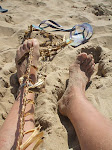 |
| Deep Six |
The
trip to set it up started badly for me, with striking railway workers in
France preventing me from getting to the airport. This resulted in losing a day that had been planned for the installation and also meant
that there was little time spare for me to explore the island. In the end it didn't really matter because the house and gardens of
the Kloster are so special there was no need to look further.
The
gallery and my home for the week was in a rustic mansion built in
1841 set amongst the remaining stones of the original medieval
monastery. It reeks history and according to the locals is haunted.
The floorboards did creak occasionally but I have no doubt that was
caused by the unusually warm weather with the sun shining out of a
clear blue sky for six days solid, rather than phantoms. One of the
locals told me that summer normally happens on a Tuesday in July!
 |
| Flotilla |
 |
| There Were 15 to Feed at Midbrake and Fleiki |
In
the semi basement, which has low arched windows looking onto the garden, are
four linked rooms providing the main gallery space with heavy wooden
beams and rough cast whitewashed walls. The walls in the two main
reception rooms on the ground floor are also used for exhibitions and
are decorated with painted canvas panels in red and green.
HelenPetersen is the curator and manager of the house which is used for a
photography residency and private events like weddings and
conferences as well as being open to the public. It is filled with
furniture from the museum collection and outside a lawn runs down
to the boathouse and stone jetty with a spectacular view of
the mouth of the fjord. The house is surrounded by very tall
ancient oaks, beech and ash. There has been very little modernisation
in the house so it feels as though you are living in a very
unprecious museum where you are allowed to sleep in the beds, sit on
the chairs and eat at the tables.
It
was interesting to set up the same exhibition in two very different
spaces. The simple white box in the Shetland Museum where
everything could be pinned to the walls made the exhibition very easy to install and I was very happy with how it looked there. But
this is something totally different at Halsnoy, very domestic, small
separated spaces, where nothing can be pinned to the walls, forcing me
to re think how things could be presented. The effect it had on some
of the pieces was dramatic, particularly Deep Six and Deep
Sixty which came alive against the coloured walls of the Red and
Green Room, I doubt if they could ever be hung in better spaces.
Curating
and installing my own work is becoming a habit that I enjoy. Each
time I present it in a new location there are challenges and
surprises that allow the work to be seen in a different way. In the
Shetland Museum the space and lighting were a pleasure to work with
but at the Kloster it is the fabric of the building and its demands
that have added a new dimension.
Being Shetlands' closest neighbour
this region of Norway is also very appropriate for this particular body
of work because there are many similarities between the two places. Not just latitude and climate or because they both have Leirviks, but also because they both lost a large part of their basketry tradition when oil was discovered in the 1960's in the sea bed between the two places.
My
thanks go to Jane Catherin Saersten Junger of Sunnhordland Museum for
inviting me to exhibit at the Kloster and to Helen Petersen who made
me very welcome, working hard to make sure everything went to plan
including gathering and washing materials from the beach for the
workshop and open day. Also my gratitude to Oyvind Hjelmen who with
Helen manages the photography residency at the Kloster and who
helped me with the installation of my benign ghosts.
The
fast ferry to Bergen made up for the trials of the outward journey.
We definitely need one of these in Shetland to go from Yell to Lerwick... I might have
to start a petition.









